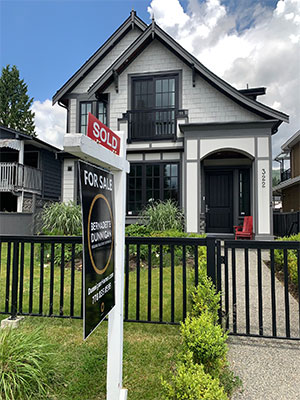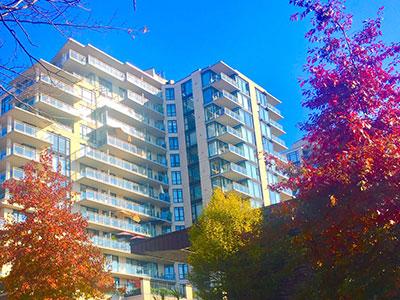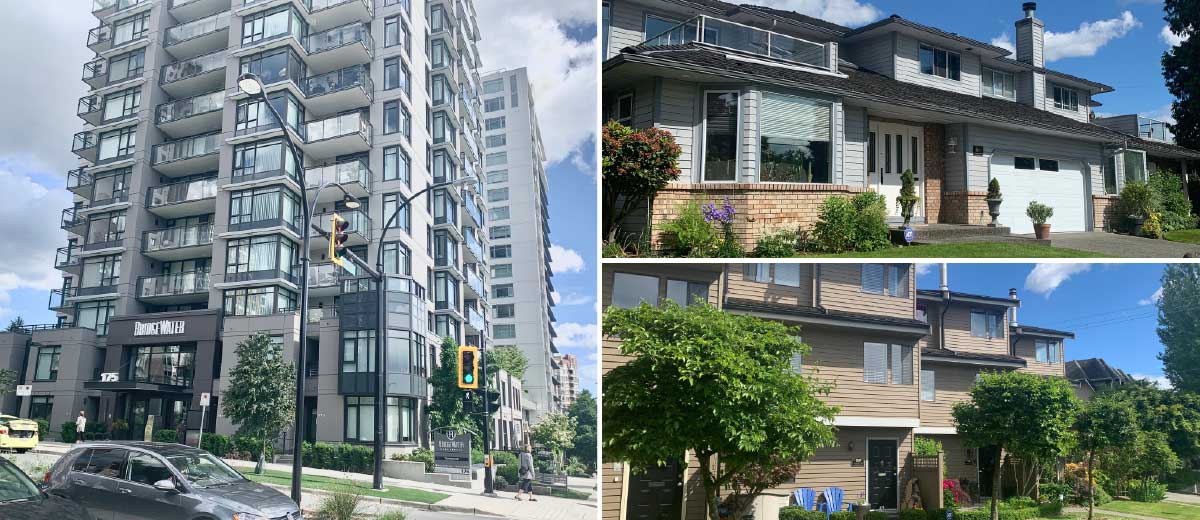Overview
It’s in your interest to hire a home inspector whether you are buying or selling a home. A home inspection serves as a valuable tool in identifying potential problems with the property. The home inspection report offers distinct advantages to both the buyer and seller by providing you a full picture of the property before you make a decision.
The typical inspection can take from 2 – 6 hours. Using a range of investigative tools and techniques, we’ll inspect the home from top to bottom. Learn more about what’s covered in the inspection report.
Home Inspections for Buyers
 Buying a home is one of the biggest purchases most Canadians will make in their lifetime.
Buying a home is one of the biggest purchases most Canadians will make in their lifetime.
Typically when you’re looking at a place, you start with the items you like. You look at the positive points such as the character or location of the home. But when you’re making a decision of whether to buy, you must be much more thorough and critical.
Here are some general tips for home buyers:
- Make your offer subject to an inspection by a government licensed inspector.
- Take the time to come to the inspection.
- Get to know the home you’re buying.
- Ask your home inspector questions.
- We’ve had extensive experience in identifying signs that may indicate the home being inspected could have been used for illegal activities such as a grow-op. If this comes up during the home inspection we’ll bring it to your attention.
Home Inspections for Sellers
 A pre-listing or pre-sale home inspection can be a valuable tool for sellers. While home inspections are typically associated with buyers, having one done before listing your home for sale can provide several advantages.
A pre-listing or pre-sale home inspection can be a valuable tool for sellers. While home inspections are typically associated with buyers, having one done before listing your home for sale can provide several advantages.
As the majority of potential buyers are going to request a home inspection, and often it’s a condition of the sale, having a pre-listing inspection is an excellent technique to earn in advance what problems or challenges there might be. With the information gained from a pre-listing inspection you have the choice to make an informed decision about how you want to deal with any potential issues.
Some of the benefits of a home inspection for sellers are:
- Can help maintain property value.
- Avoid surprises at the time of sale.
- Deal with concerns before the offer.
- Helps to sell your home.
- Generate good faith and confidence in buyers.
- Your inspection report will be provided to you directly after the home inspection is completed. The report covers everything from top to bottom and the inside and out – learn more about our inspection report.
Condo Inspections
 We conduct our condo inspections using the same wide range of investigative tools and techniques as we do for our home inspections.
We conduct our condo inspections using the same wide range of investigative tools and techniques as we do for our home inspections.
When it comes to condo inspections, it's crucial to assess not only the individual unit but also the common areas and the overall building structure. Experienced inspectors understand that certain building designs may have specific vulnerabilities and therefore are able to look for the areas that tend to have the most potential for concern such as water ingress issues, high humidity situations and mold.
If this is your first home, here are some points to help you deal with some issues that are unique to purchasing a condo or multi-family low rise.
- Ask for the Strata Council Minutes for the last 2 years. Read the minutes & highlight deficiencies you find or things you don’t understand.
- Ask if there is an Engineer's Depreciation Report for review. Should you wish, forward the engineer's report to our company for review prior to the onsite inspection, we will flag any issues of concerns and inform you accordingly.
- Obtain a copy of the Form ‘B’ financials and review accordingly.
- If the building is 20 years or older, there is a possibility the domestic water supply lines within the building and suites are the original copper installation. We will determine this for you.
The absence of visible signs present doesn't necessarily guarantee that a condo building is in perfect condition. You can rely on Cornerstone Building Inspections to thoroughly inspect and report on any areas that may be a concern.
If you are the owner of a condo, we also do 1-2-5-10 year warranty review inspections. Here is some of the information that we’re going to be reporting on during a condo inspection.
Roof:
- life expectancy of the roof coverings
- perimeter metal flashing fatigue
- roof vents & plumbing stack adequacy
- mechanical equipment efficiency
Building Envelope:
- pre-1999 exteriors with troublesome E.I.F.S. or stucco wall cladding
- signs of possible water ingress around windows and openings
- exceptional staining and cracks on exterior walls
- balconies
Common Areas – Underground Parking:
- paved driveways / access areas
- parkade – premature water ingress through suspended concrete slabs and perimeter foundation walls, structural cracks & exposed rebar, adequacy of mechanical ventilation & provision for carbon monoxide emission control
Mechanical Equipment:
- general opinion on the life expectancy of boilers & domestic water heating systems
- validation and pressurization of sprinkler systems
- detection of natural gas emissions
Storage Area:
- proficient installation of sprinkler system and heat sensor
- provision for adequate ventilation and lighting
- means of egress in emergency situations
Common Areas – Interior:
- provision for adequate fresh air into hallways
- humidity levels inside swimming pool, hot tub areas
Apartment:
- physical condition
- electrical – possible aging, aluminum wiring & unsafe practices
- plumbing & heating
- appliances
- air quality
- mold / mildew
- humidity
- windows
- sprinkler heads
- clothes dryer vents
- balconies
Roof:
- life expectancy of the roof coverings
- perimeter metal flashing fatigue
- roof vents & plumbing stack adequacy
- mechanical equipment efficency
Building Envelope:
- pre-1999 exteriors with troublesome E.I.F.S. or stucco wall cladding
- signs of possible water ingress around windows and openings
- exceptional staining and cracks on exterior wallsy
- balconies
Common Areas – Underground Parking:
- paved driveways / access areas
- parkade – premature water ingress through suspended concrete slabs and perimeter foundation walls, structural cracks & exposed rebar, adequacy of mechanical ventilation & provision for carbon monoxide emission control
Mechanical Equipment:
- general opinion on the life expectancy of boilers & domestic water heating systems
- validation and pressurization of sprinkler systems
- detection of natural gas emissions
Storage Area:
- proficient installation of sprinkler system and heat sensor
- provision for adequate ventilation and lighting
- means of egress in emergency situations
Common Areas – Interior:
- provision for adequate fresh air into hallwaysr
- humidity levels inside swimming pool, hot tub areas
Apartment:
- physical condition
- electrical – possible aging, aluminum wiring & unsafe practices
- plumbing & heating
- appliances
- air quality
- mold / mildew
- humidity
- windows
- sprinkler heads
- clothes dryer vents
- balconies
Trailer & Mobile Homes
 Mobile Homes Face a Greater Risk of Damage. Cornerstone Building Inspectors will check:
Mobile Homes Face a Greater Risk of Damage. Cornerstone Building Inspectors will check:
- Design and condition of foundation / piers
- Improper pier shims
- Bent or damaged I-beams
- Skirting
- Water sealed seams on roofing, exterior wall sheathing and penetrations such as doors and windows
- None-code compliant / unsafe solid fuel appliances, furnaces or stoves.
- Potential controversial aluminum wiring installed in older units.
- Possible carbon monoxide, natural gas, or propane emissions.
- Excessive humidity levels which can contribute to mold formation.
- Asbestos and hazardous materials.
Cornerstone Building Inspections is a registered inspector and member of the Home Inspectors Association of British Columbia. Contact us today for your pre-listing inspection – 604.618.6870


 Buying a home is one of the biggest purchases most Canadians will make in their lifetime.
Buying a home is one of the biggest purchases most Canadians will make in their lifetime. A pre-listing or pre-sale home inspection can be a valuable tool for sellers. While home inspections are typically associated with buyers, having one done before listing your home for sale can provide several advantages.
A pre-listing or pre-sale home inspection can be a valuable tool for sellers. While home inspections are typically associated with buyers, having one done before listing your home for sale can provide several advantages. We conduct our condo inspections using the same wide range of investigative tools and techniques as we do for our home inspections.
We conduct our condo inspections using the same wide range of investigative tools and techniques as we do for our home inspections. Mobile Homes Face a Greater Risk of Damage. Cornerstone Building Inspectors will check:
Mobile Homes Face a Greater Risk of Damage. Cornerstone Building Inspectors will check: